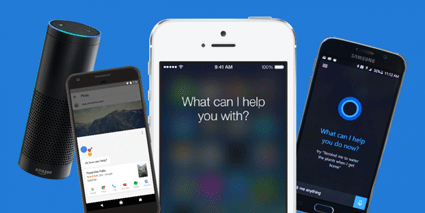Most people today use digital assistants as hi-tech kitchen timers or to check the weather, but senior citizens might soon rely on Amazon’s Alexa for much more.
_______________________________________________________________________________________
By Brad Berens
 Two personal events over the summer made me realize that one of the most compelling use cases for digital assistants concerns senior citizens. I was primed to think this because this week the Center has released a mini-report — Sharpest Edge: Digital Assistants – that explores how programs like Alexa, Siri, Google Assistant, Cortana, Eva, and now Bixby are likely to transform how Americans use technology and interact with information.
Two personal events over the summer made me realize that one of the most compelling use cases for digital assistants concerns senior citizens. I was primed to think this because this week the Center has released a mini-report — Sharpest Edge: Digital Assistants – that explores how programs like Alexa, Siri, Google Assistant, Cortana, Eva, and now Bixby are likely to transform how Americans use technology and interact with information.
In addition, Amazon, Apple, Google, Microsoft, and Samsung are all investing heavily in health care. (The mini-report is free, so download it now!)
In the first personal event, B, a 91-year-old family member fell in her retirement home apartment and shattered her shoulder. She couldn’t move, couldn’t reach the emergency button in her kitchen, and spent a long night immobilized in agony on the floor. A staff member found her the next morning. The fall precipitated a rapid decline. B died a month later.
When I heard the story of B’s fall my first thought was, “if only she’d had an Alexa in her apartment, then she might have gotten care immediately.”
The second event happened to S, a 76-year-old family member, whose back went out while he was upstairs. His wife, R, was downstairs watching the evening news at the other end of their home. S couldn’t move. R couldn’t hear him calling or banging on the wall. She found him an hour later and got him the help he needed. Luckily, S is still among the living.
When I heard this story, again, my first thought was, “if they’d had an Alexa in the room, S wouldn’t have been frozen and helpless for an hour.”
One common misperception about elderly people is that they are technophobic Luddites who don’t like technology. Even in these early days of digital assistants, we see this is not true. Here’s a chart from the new mini-report that shows the percentages of different demographics’ use of digital assistants:

Thirty-one percent of younger seniors and 27 percent of older seniors are already using digital assistants across smartphones and smart speakers.
With B and S, I thought about Alexa specifically because Amazon’s Echo devices (the typical containers for the Alexa digital assistant) are currently the most prominent smart speakers. Moreover, Amazon is working furiously to install Alexa everywhere it can, including cars and college dorm rooms.
Unlike smartphones, which some people turn off when they get home (really, this happens), or smartwatches that stop paying attention when you take them off, smart speakers are always on, always listening so long as they’re plugged in and connected to the internet.
If B or S had been near Echo devices they each might have croaked, “Alexa, help!” (At the moment, Alexa cannot directly call 911, although I suspect this will change.)
You don’t need Alexa to make calling for help easy. Specialized companies like LifeAlert (with its famous TV commercial tagline, “I’ve fallen and I can’t get up!”) have been around since the 1980s. LifeAlert and its counterparts get vulnerable people help quickly through specialized devices like pendants and wall-mounted buttons. These devices are among the first wearable computers, so they’re precursors to fitness devices like Fitbits, smartwatches like Apple Watch, and Heads-Up Displays like Google Glass or Oculus Go.
While you don’t need Alexa to get frictionless access to emergency help, the reverse is also true: vulnerable people will soon have alternatives to medical alert services that come with monthly fees. These fees are expensive enough that, for example, LifeAlert declines to share prices on their website. Instead, the site says, “Life Alert’s 36-month membership cost less than one month at a retirement institution.” Alexa access comes as part of the purchase of an Echo device; you don’t even need a Prime membership. This might prove alluring to some thrifty seniors.
_________________________________________________________________________________________________
This week the Center has released a mini-report — Sharpest Edge: Digital Assistants – that explores how programs like Alexa, Siri, Google Assistant, Cortana, Eva, and now Bixby are likely to transform how Americans use technology and interact with information.
_________________________________________________________________________________________________
Since the iPhone’s launch in 2007, we’ve seen smartphones absorb formerly independent things (like cameras, flashlights, notebooks, iPods, address books, and calendars) and turn them into apps. Digital technology dissolves physical devices and moves their functions into multipurpose platforms. Smart speakers are another, newer, example of digital dissolving.
I expect that LifeAlert and some of its counterparts will quickly start working with Alexa, Siri and other digital assistants to create app-based versions of their services.
Amazon and health care
I’ve mostly talked about Amazon in this column for two reasons. First, the Echo devices are currently the most popular smart speakers (commanding 41 percent of the market, according to Strategy Analytics, although this is a decline from over 80 percent in 2017).
The second reason is where things get interesting: how does Alexa fit into Amazon’s broader health care ambitions? As I described in a January column, Amazon, Berkshire Hathaway, and JPMorgan Chase have launched a joint venture in the health insurance space, hiring Atul Gawande as its CEO on June 20. Eight days later, Amazon acquired online pharmacy PillPack for $1 billion, making the ecommerce giant a nationwide pharmacy in one move.
Amazon frequently takes a loss in one part of its business in order to increase the number of transactions taking place in another part of its business. The company frequently takes a loss paying for Amazon Prime two-day delivery, but because Prime members spend much more than non-Prime members, it’s healthy for Amazon’s bottom line.
For many Americans past middle age, each new decade brings new monthly prescriptions. That’s a lot of transactional volume. If Amazon expands its healthcare joint venture into other companies and environments, then Alexa might become a primary interface through which Americans manage their health care, asking questions, getting remote advice, and scheduling face-to-face appointments.
Watch for Amazon to start pushing retirement homes and other eldercare facilities to integrate Alexa into every room.
It’s not only a way to help senior citizens stay safe and healthy; it also makes compelling business sense.
__________

Brad Berens is the Center’s Chief Strategy Officer.
See all columns from the Center.
August 22, 2018

